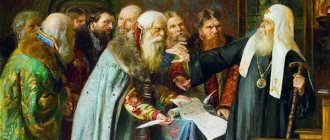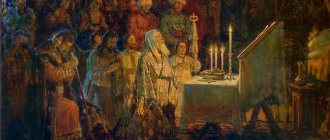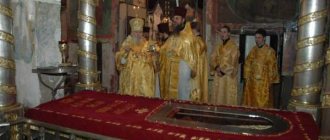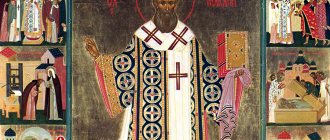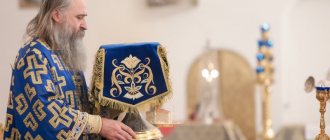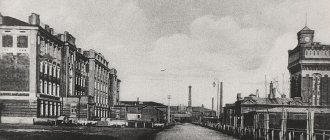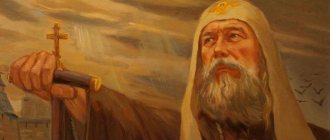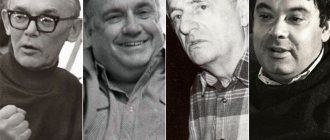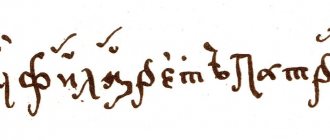"Save me, God!".
Thank you for visiting our website, before you start studying the information, please subscribe to our Orthodox community on Instagram, Lord, Save and Preserve † - https://www.instagram.com/spasi.gospodi/. The community has more than 60,000 subscribers. There are many of us like-minded people and we are growing quickly, we post prayers, sayings of saints, prayer requests, and timely post useful information about holidays and Orthodox events... Subscribe. Guardian Angel to you!
Saint Tikhon, Patriarch of Moscow, is a truly pious and honest man, whose spirituality knew no boundaries or obstacles. And in the most difficult times of wars and famine, it was he who became a mediator between God and people in order to proclaim faith and endow his people with spiritual strength.
- Relics of Patriarch Tikhon
Patriarch Tikhon, biography
The future patriarch (in the world Vasily Belavin) was born on January 19, 1865 in the family of a clergyman, which was distinguished by a strong patriarchal way of life, piety and a great love of work.
At the age of nine, the saint entered the Theological School, and after graduation he left his parents’ home and continued his education at the seminary. Vasily was very kind since childhood, and his studies came quite easily to him. Therefore, he graduated from the seminary as one of the best students. His spiritual teaching did not stop there - he continued his studies at the Theological Academy. And already at the age of 23 he became a candidate of theology.
The short life of his childhood and youth had its spiritual continuation in adulthood. At the age of 26, he took his first step in order to get closer to the Teacher and his great deeds - he bows his will before the Lord and makes the three highest vows:
- poverty;
- virginity;
- obedience.
Afterwards he was tonsured and named Tikhon (in honor of St. Tikhon of Zadonsk), the very next day he was ordained as a hierodeacon, and soon as a hieromonk.
Brief biography of the deeds of Patriarch Tikhon
From 1892-1899 the saint went through a difficult spiritual path of formation:
- inspector of the Theological Seminary;
- rector with the rank of archimandrite;
- Bishop of Lublin with appointment as vicar of the Kholm-Warsaw diocese.
The best article for you, go to: The Life of St. John Kushchnik
Tikhon spent only a year in the first department in his church life. And when the decree came about his transfer, all the believers of the Kholm region cried day and night. The whole city saw him off with tears, and this is evidence of how loved and respected this man was.
And it was like this all his life: no matter where he was, people did not want to let him go. Even in Orthodox America, where he wisely led his flock for 7 years, they still call him the Apostle of Orthodoxy.
Tikhon did everything possible to develop spirituality:
- built temples;
- opened libraries;
- tidied up abandoned churches;
- conducted teaching activities both among the common people and among representatives of the clergy;
- I personally traveled to remote villages and towns in order to bring spiritual life there into a state of unity.
During the First World War, he was able to protect the relics of the Vilna martyrs and other great shrines from enemy attacks, faithfully served in overcrowded churches, walked around hospitals and blessed those going to war to defend their Fatherland.
“He bore the full weight of the Church.” About the fate of Patriarch Tikhon
On October 9, the Russian Orthodox Church celebrates the day of glorification of St. Tikhon , Patriarch of Moscow and All Russia, canonized as a confessor. Elected to the patriarchal throne of the Russian Orthodox Church in 1917, Tikhon became the herald of the path that the Church was to take in new, difficult conditions after almost 200 years of headlessness (the patriarchate was abolished by Peter I in 1721).
Metropolitan Sergius (Stragorodsky) spoke of Patriarch Tikhon this way: “He alone fearlessly walked the straight path of serving Christ and His Church. He alone bore the entire burden of the Church in recent years. We live by it, move and exist as Orthodox people.”
Prophetic dream
Vasily Ioannovich Belavin (that was the name of the future Patriarch Tikhon) was born on February 1, 1865 (according to modern times) in the small village of Klin near the city of Toropets, Pskov province (now Toropets as part of the Tver region). Vasily’s father is the hereditary priest John Timofeevich Belavin, so Vasily’s future choice to serve the Church was expected. One day Father John spent the night with his sons in the hayloft. He dreamed of his mother; she prophesied about the fate of her grandchildren: one would live an ordinary life, the second would die young, and the third, Vasily, would become great. The prophetic dream was fulfilled exactly.
Vasily Ioannovich, as the son of a priest, graduated from the Toropets Theological School, then the Pskov Theological Seminary and, finally, in 1888, the St. Petersburg Theological Academy. Thanks to his modesty, complacency, sedateness and seriousness, and willingness to always help his friends, his seminary classmates jokingly called Vasily “bishop.” And in the academy - “patriarch”. After graduating from the St. Petersburg Theological Academy, Vasily Belavin was assigned as a teacher at his native Pskov Theological Seminary.
In 1891, Vasily Ioannovich took monastic vows with the name Tikhon - in honor of his beloved saint, St. Tikhon of Zadonsk. Very soon he was ordained as a hieromonk (monastic priest) and sent to the Kholm Theological Seminary, where Tikhon became rector.
Apostle of Orthodoxy in America
In 1897, 33-year-old Tikhon was ordained Bishop of Lublin and very soon sent to America. A period of life almost a decade long began. Bishop of the Aleutian and North American Tikhon managed to streamline the life of Orthodox parishes in the USA and Alaska, organized parish schools and orphanages, erected many new churches, including the Cathedral in the name of the Wonderworker Nicholas in New York, which is still the main cathedral of the Patriarchal parishes in States and in which the representative office of the Moscow Patriarchate in the USA is located. In Minneapolis, Bishop Tikhon founded a theological seminary. Under Tikhon, many Christians of other faiths became acquainted with Orthodoxy for the first time in American history. Many pastors turned to him with difficult questions: about the possibility of Eucharistic communion, the reunification of divided Churches, etc. Bishop Tikhon took an active part in the translation of Orthodox liturgical books into English. An easy-going, joyful and cheerful person in life, Tikhon gained fame in the USA as a true apostle of Orthodoxy. In Orthodox America, he is still one of the most revered saints.
200 years without a patriarch
In 1905, during his only trip to the Russian Empire from America, Tikhon was elevated to the rank of archbishop. In 1907, he was transferred to head the Yaroslavl See, in 1914 he was already Archbishop of Vilna and Lithuania, and on June 23, 1917, he was elected to the Moscow See, already in the rank of Metropolitan.
The February Revolution of 1917 made unprecedented freedom possible in Russia. A local council in the Russian Orthodox Church had not met for almost 200 years, and suddenly – such an event! Moreover, they decided to hold it according to the ancient tradition, according to which lay people took part in the selection of bishops. The secular authorities did not want to see certain individuals among the higher clergy, among them was Archbishop Tikhon. But the council decided otherwise. It was decided to restore the patriarchate. Among the three candidates were: Archbishop Anthony (Khrapovitsky) - a famous theologian; Archbishop of Novgorod Arseny (Stadnitsky) - one of the oldest bishops of the Russian Orthodox Church; Metropolitan of Moscow Tikhon. According to the rules, the patriarchal throne should have gone to one of the candidates by lot. The lot fell to Metropolitan Tikhon. On November 21, 1917, the enthronement of the new patriarch took place in the Assumption Cathedral of the Moscow Kremlin.
At the service of the Church
Patriarch Tikhon immediately had to resolve the issue of the relationship between the Church and the new state system, which, we recall, was hostile towards it. The entire burden of this situation fell on the shoulders of the new patriarch; it was necessary to preserve Orthodoxy in the conditions of revolutionary hard times and the Civil War. It is enough to imagine that Patriarch Tikhon suddenly turned out to be the only legally elected “leader” of the people, since the majority of the inhabitants of Russia participated in the elections of members of the Local Council. And this is in conditions when the Bolsheviks dispersed the Constituent Assembly - the body that was supposed to determine the state structure of the country after the revolution, the form of government and the future path of Russia’s existence.
In the winter of 1918, Patriarch Tikhon made an official appeal to his flock, in which he condemned the bloody unrest reigning in the country, denounced the persecutors of Orthodoxy and called on believers to defend the trampled Church. Of course, the Bolshevik leaders could not like this; until the end of the patriarch’s life, at least three attempts were made on him (all unsuccessful). And how many times was he accused of being counter-revolutionary, collaborating with the white movement; he was summoned to Lubyanka for interrogation, kept under house arrest, put on trial, kept in captivity in the Donskoy Monastery and much more... But the patriarch remained a true defender of Orthodoxy and was adamant.
Will
It was possible to remove Patriarch Tikhon only in 1923 with the help of a renovationist “council”, in which dozens of illegally installed bishops (many were even married) took part. This “council” allegedly unanimously voted to defrock the patriarch and become a monk. In a new case conducted by the GPU, the saint was threatened with execution, but it never took place. The whole world followed these events, because the authority of the Moscow Patriarch spread throughout the globe.
In his will dated January 7, 1925, His Holiness wrote: “During the years of civil devastation, by the will of God, without which nothing happens in the world, Soviet power became the head of the Russian state. Without sinning against our faith and the Church, without allowing any compromises or concessions in the area of faith, in civil terms we must be sincere towards the Soviet government and work for the common good, conforming the order of external church life and activities with the new state system... Together with By this we express confidence that the establishment of pure, sincere relations will encourage our authorities to treat us with complete confidence.” This consideration became possible not only because Tikhon sought to ease the fate of the Church, but also because the Civil War was over, Soviet power could be considered legitimate and the Russian Orthodox Church needed to take its place in the construction of a new legal state.
His Holiness Patriarch Tikhon died on April 7, 1925, on the feast of the Annunciation of the Most Holy Theotokos. He was buried in the Moscow Donskoy Monastery. Canonized by the Council of Bishops of the Russian Orthodox Church on October 9, 1981, he stands at the head of the Council of New Martyrs and Confessors of Russia.
Enthronement of Patriarch Tikhon
After the restoration of the patriarchate, for his great deeds, Saint Tikhon was chosen by lot to the post of Patriarch of Moscow. The enthronement (enthronement) of the new patriarch was carried out in the Assumption Cathedral on November 21, 1917, on the feast of the Dormition of the Blessed Virgin Mary.
During a terrible period, when everyone was gripped by anxiety for the future, anger grew and mortal hunger consumed the people, fear penetrated into homes and churches. And it was at this time that God’s hand elevated Tikhon to the Patriarchal throne, so that he would be one of the first to ascend to Golgotha and become a holy martyr.
Every day the saint prayed for his Fatherland and his people; he was ready to go to certain death following his Teacher in order to extinguish the fire of war and revive the spiritual principle.
Arrest of Patriarch Tikhon for disobedience
His Holiness took an active part in the grandiose crusades, which were organized with his blessing to raise religious feelings in the minds and hearts of the people. He also fearlessly conducted services in churches in many cities, thereby strengthening the spiritual flock. The patriarch zealously opposed the destruction of the Church.
The best article for you, go to: Saint Joasaph of Belgorod: prayer, life, icon
The result of all these actions was the arrest of Tikhon and his imprisonment for more than one year. The authorities, unable to break the will and spirit of the saint, were forced to let him go, but began to carefully monitor his every step. Twice attempts were even made to kill the patriarch. During the second attempt, an associate of the saint was tragically killed. But despite the terrible persecution, Tikhon continued to live and act in the name of the Church and the people.
“I wanted to show Patriarch Tikhon as a person, and not as an icon”
The house in which the future St. lived from 1869 to 1878.
Tikhon with his parents priest Ivan Timofeevich and Anna Gavrilovna - Saint Tikhon graduated from the seminary in 1884, and accepted monasticism only in 1891. Wasn’t monasticism his original dream?
— Vasily Bellavin had a fiancee - the daughter of a priest, also of the Pskov diocese. When he left to study at the St. Petersburg Academy, Maria remained waiting for him. And when he returned, he found out that she had gotten married and had already given birth to a child. He didn’t reproach her for anything, he only asked: “Are you happy?” She replied: "I'm happy."
And after some time he became a monk. This monasticism was, of course, not out of unhappy love, but by choice - he saw God’s providence in what happened.
—What was Patriarch Tikhon like as a person? Not according to duty, but according to the heart? What kind of character was this?
— The PSTGU publishing house recently published a two-volume book, “Contemporaries about Patriarch Tikhon,” compiled by M.E. Gubonin. From there you can find out that even in the seminary, classmates noted his meek, completely good-natured character. Patriarch Tikhon was very sincere, loved people, and knew how to win them over.
His Holiness always communicated very warmly with the clergy. This manifested itself in the early years of his episcopal service, first in America (1898-1907) and then in Yaroslavl (1907-1913) and Lithuania (1914-1917) - he tried to get to know each priest personally, communicate, console each one, and even help financially. The saint also had a great sense of humor.
From the memoirs of contemporaries: On July 12, 1919, an attempt was made on the patriarch’s life: a woman in the crowd stabbed him in the side. The patriarch was saved by a leather belt, which softened the blow. “With what good-natured humor he spoke in his Lavra chambers after the Liturgy about what happened to him. And how colorfully and good-naturedly His Holiness described the entire scene of the assassination attempt, when the frightened clergy rushed to the carriage of the wounded Patriarch, as the archpriest of the temple (if memory serves, Khotovitsyn) raised a bloody knife above his head and theatrically exclaimed: “Orthodox, the Patriarch is wounded!” “I,” added His Holiness, “was very frightened, I thought: “God forbid, the crowd will think that it was the priest who stabbed me with a knife and, God forbid, they will beat him up!” This is an example of the courage that did not leave the Patriarch, which has sunk into my heart for the rest of my life.” Archpriest Dmitry Khvostov. (Quoted from the book “Contemporaries about Patriarch Tikhon”)
On the left is the Lublin Transfiguration Cathedral, where Bishop Tikhon served. Photo from 1891. On the right is the first volume of the book “Contemporaries about Patriarch Tikhon”
— When Patriarch Tikhon was imprisoned in the Donskoy Monastery, he was guarded by Red Army soldiers, and among them Komsomol member Maria Veshneva. She, an unbeliever, personally hostile to the patriarch, towards the end of her stay with him, said this:
“Intellectually, I understand that he is an enemy and, obviously, very dangerous. And when communicating with him, I don’t feel anything hostile. He treats us perfectly. Always attentive, affectionate, even. I didn’t see him irritated or moody.”
He gave the Komsomol member an embroidered napkin as a souvenir, saying: “This is a memory of the days in Donskoy.” She didn’t do anything special for him - she just didn’t commit atrocities, didn’t offend him, but acted according to instructions, and he wished her Merry Christmas, Happy Easter, gave her some gifts and himself radiated kindness and love.
Therefore, of course, today the image of St. Tikhon is very important. Not only as the primate of the church, who survived despite persecution and oppression by the authorities, but also as the father of the Orthodox people, as he was for his contemporaries.
The word “patriarch” is translated as “father of fathers.” When the monarchy ended, he became the head of the people not only in a spiritual sense, but also in an ethnic sense.
The life of Patriarch Tikhon of Moscow in recent years
The last and most painful year of his life, the saint, already very ill and constantly persecuted by the authorities, still invariably held services. On March 23, 1925, he celebrated the last Divine Liturgy, and on the feast of the Annunciation of the Most Holy Theotokos he passed into eternal life with a prayer to the Lord on his lips.
Relics of Patriarch Tikhon
Many years have passed since the passing of Patriarch Tikhon, and only in the 90s the Lord gave the Orthodox people his holy relics, as a symbol of spiritual strengthening for future difficult times. They are located in the large cathedral of the Donskoy Monastery.
Revolutionary years. Patriarchate
When the All-Russian Local Council opened in 1917, it touched upon a long-standing issue that required an early resolution: the issue of restoring the patriarchate in Rus'.
It must be said that at that time this idea was supported not only by the clergy, but also by the people. In addition to internal church reasons, the social and political situation in Russia was pushing for a speedy resolution of this issue. The February Revolution, the overthrow of the monarchy, the impending chaos and other circumstances led to an urgent need for the Russian Church to have a single responsible leader, capable, with the help of God, to unite the clergy, monastics and laity with his power, love and wise pastoral activity.
And Metropolitan Tikhon was awarded this responsible mission. First, as a result of four rounds of voting, several candidates were elected, and the final choice was determined by lot. The enthronement of the Patriarch took place on November 21, in the Kremlin Assumption Cathedral.
Despite the increasingly complicated situation and the intensifying persecution of clergy, Patriarch Tikhon, as best he could, fulfilled his duty to God, the Church and his own conscience. He openly served in churches in Moscow and other cities, led religious processions, condemned bloody riots, denounced theomachism, and strengthened faith in people.
In addition, in 1918, he uttered an anathema against the enemies of the Lord Jesus Christ (by which many understood the Bolsheviks) and condemned the murder of Nicholas II.
When the Bolsheviks decided to defeat the Church from within, breaking it into pieces, he did his best to prevent the implementation of the “renovationist schism.” All this, of course, could not help but set the atheistic authorities against him.
By 1921, as a result of the civil war and drought in the eastern regions of the country, there was a catastrophic shortage of food in the state, and a terrible famine occurred. And so, finding an opportune moment, under the pretext of helping the starving, the authorities decided to destroy Orthodox churches.
At this time, Patriarch Tikhon turned for help to the heads of Christian Churches located abroad, founded the Committee to Relief the Famines, and blessed the donation of valuables that had no liturgical significance. At the same time, he resolutely opposed attacks on Christian shrines.
But the authorities did not even think about loosening the stranglehold they had thrown on the Church. Wanting to achieve greater success in propaganda, she was accused of greed and unwillingness to help the suffering. There was another wave of arrests of clergy. Soon the Patriarch was taken into custody and remained in captivity for several months, from May 1922 to June 1923. Then, not finding any obvious good reasons for public reprisals, the atheists were forced to release the saint.
Perhaps this decision was influenced by Saint Tikhon’s preliminary consent to some normalization of relations between the church leadership and state authorities, some detachment from the “political struggle,” which he subsequently declared publicly. In addition, the authorities found themselves under protest pressure from the British government and the Western public in general. Of course, the Patriarch made concessions under enormous pressure and to the extent required by the conditions for the survival of the Church in those circumstances, as far as his pastoral conscience allowed.
For the rest of the time, Saint Tikhon remained under close supervision. In addition, an assassination attempt was organized on him, as a result of which his cell attendant, Yakov Polozov, died. The Patriarch himself remained alive. This attempt was veiled as a robbery (there are three attempts in total).
While staying at the Donskoy Monastery, the Patriarch, despite aggressive pressure from the outside, performed divine services and received many people reaching out to him for support and consolation.
On March 25, 1925, on the Feast of the Annunciation, sixty-year-old Patriarch Tikhon gave up his spirit to God. By this time, the Orthodox Church had barely recovered from all the misfortunes that it had to endure, and was very weak. But it was no longer possible to crush the spirit of struggle for one’s right to exist.
The farewell to the saint lasted several days and was accompanied by crowds of people. The funeral ceremony took place with the participation of dozens of bishops and priests.
After the funeral of Saint Tikhon, the authorities published a will on his behalf, which contained a number of theses they liked. It is difficult to say to what extent it actually belonged to the authorship of the Patriarch. In any case, many questioned this will.
Message from Patriarch Tikhon
One of the most famous acts of the Great Saint was his Message in connection with the closure of the Holy Trinity Sergius Lavra. The reason for its writing was the opening of the relics of St. Sergius. And this event was supposed to be the beginning of the complete destruction of the spiritual life of the people, for an Orthodox person would not be able to enter the temple and offer prayers to God, and there would not be a single minister who could help him in this.
The Patriarch called to stand guard over the people's church interests to the last, so as not to lose the spiritual reserve that Sergius bequeathed. He called on Orthodox people to pray that they would help return the benefactor given by the Reverend, cleanse their hearts of all evil and lead to repentance.
Prayer to Saint Tikhon
O our good shepherd, the great holy Patriarch Tikhon, as if you were a city on high, your good deeds still shine before people. We, as you, standing before the throne of the Most Holy Trinity, have great boldness in prayers before the Lord. Look now at us, sinful and unworthy of your children, for you, as you have great boldness before the Creator of all things, now we fall down and fervently pray: pray to the Lord, that He may give us the determination to acquire the piety of our fathers, which you have acquired from your youth. In your life you were a zealous protector and keeper of the true faith; help us to unshakably observe the Orthodox faith. Because your quiet soul has greatly succeeded in divine humility, teach us to nourish our minds not with the turbulent human wisdom, but with the humble knowledge of the will of God. Before the face of the fierce enemies of Christ, you boldly confessed the True God; with your prayer, strengthen us, the faint-hearted, so that we will always and everywhere resist the spirit of atheism and flattery. To her, servant of God, do not despise us who pray to you, for we ask not only for deliverance from troubles and sorrows, but for strength and firmness, generosity and love, in order to endure these misfortunes that rise upon us. Ask us for unflagging patience even until the end of our lives, peace with the Lord and remission of sins. Holy Father! Tame the winds of unbelief and unrest in our country, may the Lord establish silence and piety and unfeigned love in the Russian Land. With your prayers may you save us from internecine warfare, may we strengthen our Holy Orthodox Church, may it not become depleted of true shepherds, good workers who rightly rule the word of the Gospel truth. Forbid the errors of the sheep of Christ's flock. Most of all, pray to the Lord of strength, that the Russian Land may be reborn with holy repentance and with one heart and one mouth glorify the Marvelous God in His saints in the Trinity, the Father and the Son and the Holy Spirit forever and ever. Amen.
Faith without support and adherence to it is dead. It is such people-lights as Patriarch Tikhon, with their example and sacrifice, that do not allow its blessed flame to go out for centuries.
If you find an error, please select a piece of text and press Ctrl+Enter.
Anathema of Patriarch Tikhon
Another greatest work of the saint was the message of January 19, 1918 with anathema (excommunication from the Church, expulsion) to the atheists. In it, Tikhon addressed those who are godlessly destroying the righteous work of Christ, bringing terrible events upon their people and their Fatherland. He told them about suffering after death, called on them to build and not destroy, and most importantly, to repent to the Lord for all their deeds. He also convinced by his example that no one could ever break the word and work of God.
The best article for you, go to: What does the Ostrobramskaya Icon help with?
Saint Tikhon, Patriarch of Moscow, is one of the greatest people in Orthodoxy. His contribution to the history of Christianity cannot be assessed. The word of the saint is firm and pure, and his deeds are fearless and righteous, filled with faith in the Lord and his people.
The life of Patriarch Tikhon is a difficult path to God, on which he, like no one else, was able to announce to people about the unshakable grace of the Lord, teach people to love and live spiritually even in the most terrible times, for only faith always saves and gives strength, and therefore prolongs life, I grant the eternal Kingdom, peace and tranquility.
The Lord is always with you!
Watch the video about Tikhon, Patriarch of Moscow:
Troparion for the glorification of Tikhon, Patriarch of Moscow and All Rus'
Let us praise the apostolic traditions of the zealot / and the good shepherd of Christ to the Church of Christ, / who laid down his soul for the sheep, / chosen by God’s lot / All-Russian Patriarch Tikhon / and to him with faith and hope we cry out: / through the intercession of the saints to the Lord / keep the Russian Church in silence, / squandered Gather her children into one herd, / convert those who have departed from the right faith to repentance, / save our country from internecine warfare // and ask for the peace of God among the people.
After 1917, in many documents his last name was written as Belavin .
